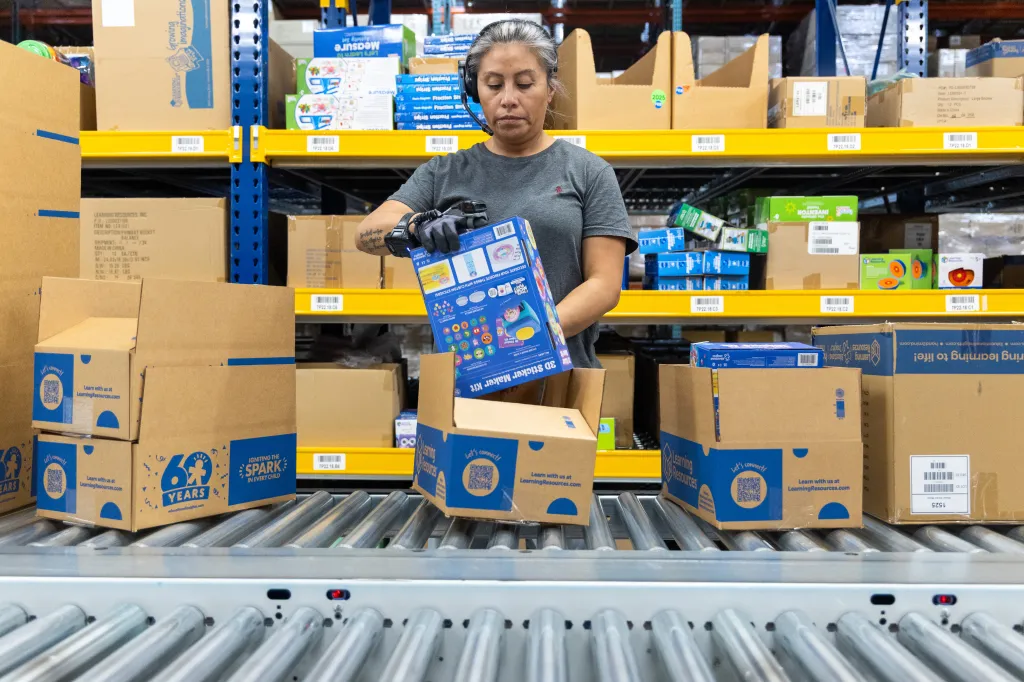
In an airy warehouse in Vernon Hills, workers pack educational toys designed to bring children joy and expand their worlds. Plastic apples that can be taken apart to understand fractions, a toy cash register and a kit with a purple stethoscope are stacked on blue metal racks, waiting to be shipped to a budding elementary school CEO or doctor.
The orderly buzz of workers driving forklifts and the routine whirring of a conveyor belt belie the fact that Learning Resources and its sister company, hand2mind, have been in the eye of a storm trying to adapt to tariffs. The companies produce around 50% of their products in China.
When the Trump administration’s tariffs on goods from China shot up in April from around 20% to around 104%, CEO Rick Woldenberg, who has a law degree from the University of Chicago, decided he couldn’t stand by and watch. He hired counsel and sued President Donald Trump’s administration in federal court, saying that the tariffs were unlawful.
In May, the court ruled in favor of Woldenberg, saying that the Trump administration had inappropriately cited the International Economic Emergency Powers Act when imposing the tariffs.
The tariffs stayed in effect while the Trump administration appealed the ruling. Earlier this month, the U.S. Supreme Court agreed to decide the legality of Trump’s tariffs at a hearing Nov. 5, consolidating Woldenberg’s case with lawsuits filed by businesses in other states.
“We believe the tariffs are unlawful. That’s why we went to the Supreme Court,” Woldenberg said. “Rather than reshape our company to suit the needs of politicians … we’re trying to assert our rights as citizens so that we can continue to run our business according to our good judgment.”
Trump has said that his rationale behind tariffs on China was to stimulate domestic manufacturing and create jobs. As of last month, the U.S. economy had 14,000 fewer manufacturing jobs than it did in April, The Associated Press reported. A July analysis by the JPMorganChase Institute found that tariffs would cause around one-third of American companies to collectively incur a direct cost of $82.3 billion, costs that would be managed through price hikes, layoffs, hiring freezes or lower profit margins.
Steven Durlauf, an economics professor at the University of Chicago’s Harris School of Public Policy, said American firms typically pass on around 80% of tariff-related costs to consumers. More expensive products reduce sales, leaving firms less likely to invest in domestic production.
“They’re going to have fewer sales and less activity as an organization,” Durlauf said. “In a world like that, you’re less willing to build warehouses and less willing to have new employees involved.”
In isolation, tariffs could stimulate domestic production, because American manufacturers would have less competition. However, that logic doesn’t bear out in practice, Durlauf said.
“The economy is this incredibly interconnected system,” Durlauf said. “You (might) have domestic toy manufacturing increase, but retailers who are selling toys are going to be hurt.”
Mark Denzler, president and CEO of the Illinois Manufacturers’ Association, said opinion on tariffs has been split among the businesses his organization represents in the state. Some, like Learning Resources, have been struggling. But others have welcomed tariffs. Denzler and those manufacturers say tariffs, when used selectively, can help combat competition from countries that may be violating trade rules by stealing intellectual property or dumping products illegally.
Despite the split opinions on tariffs, Denzler said all businesses have struggled to deal with the volatile environment created by the Trump administration announcing and then walking back tariffs without much warning.
“Businesses like certainty and it’s difficult for them to plan effectively with the changing announcements,” Denzler said.
This resonates with Woldenberg, who is experiencing firsthand the complexities of tariffs.
“It’s like sand shifting under our feet every day,” Woldenberg said as he walked through the Vernon Hills warehouse, waving to employees. “No business can deal with tariffs after a certain point. It’s like making people wear ankle weights and seeing how fast they can run.”
Woldenberg hasn’t laid off any of his employees, but he has stopped filling some vacant positions. The companies also raised prices on some of Learning Resources’ toys by around 5% and cut expenses, like a planned $600,000 investment in racks for the warehouse and professional development workshops for his employees.
“The more they charge us in tariffs, the less we have to spend on our people here,” Woldenberg said.
Since the 1980s, Learning Resources has been doing a little over half of its production in China, where it has developed long-standing relationships with suppliers and family businesses. Other toy parts are sourced and produced from Taiwan, Thailand, South Korea, India, Vietnam, the United States and Canada.
In 2016, when Trump first came into office promising to impose tariffs on China, Woldenberg began moving some production to Vietnam and India. But it’s been difficult to enter new markets and produce toys of the same quality at a similar price point.
Woldenberg said he is determined to fight the tariffs and honor the legacy of his family, which has been doing business in the Chicago suburbs since 1916. His family started out producing laboratory equipment, but in the 1960s pivoted to making Montessori toys for local school districts.
By 1990, when Woldenberg joined the business, it had expanded into more complex educational toys and began supplying retailers in addition to schools. Today, Learning Resources exports toys to over 100 countries worldwide and employs 500 people. All three of Woldenberg’s children work at Learning Resources and hand2mind, the fourth generation of the family involved in the business.
Woldenberg gets excited by the wonky aspects of the business, like new headsets his company bought to help workers pack products more efficiently. But he also cherishes the bigger impacts, like the children who overcome speech delays when they practice forming words using “Mirror My Sounds Phoneme Set,” a product that hand2mind makes.
“The (employees in the) community that we live in, and millions of children have their educational trajectory affected by what we do,” Woldenberg said. “It’s a big source of motivation to fight the threat from tariffs.”



